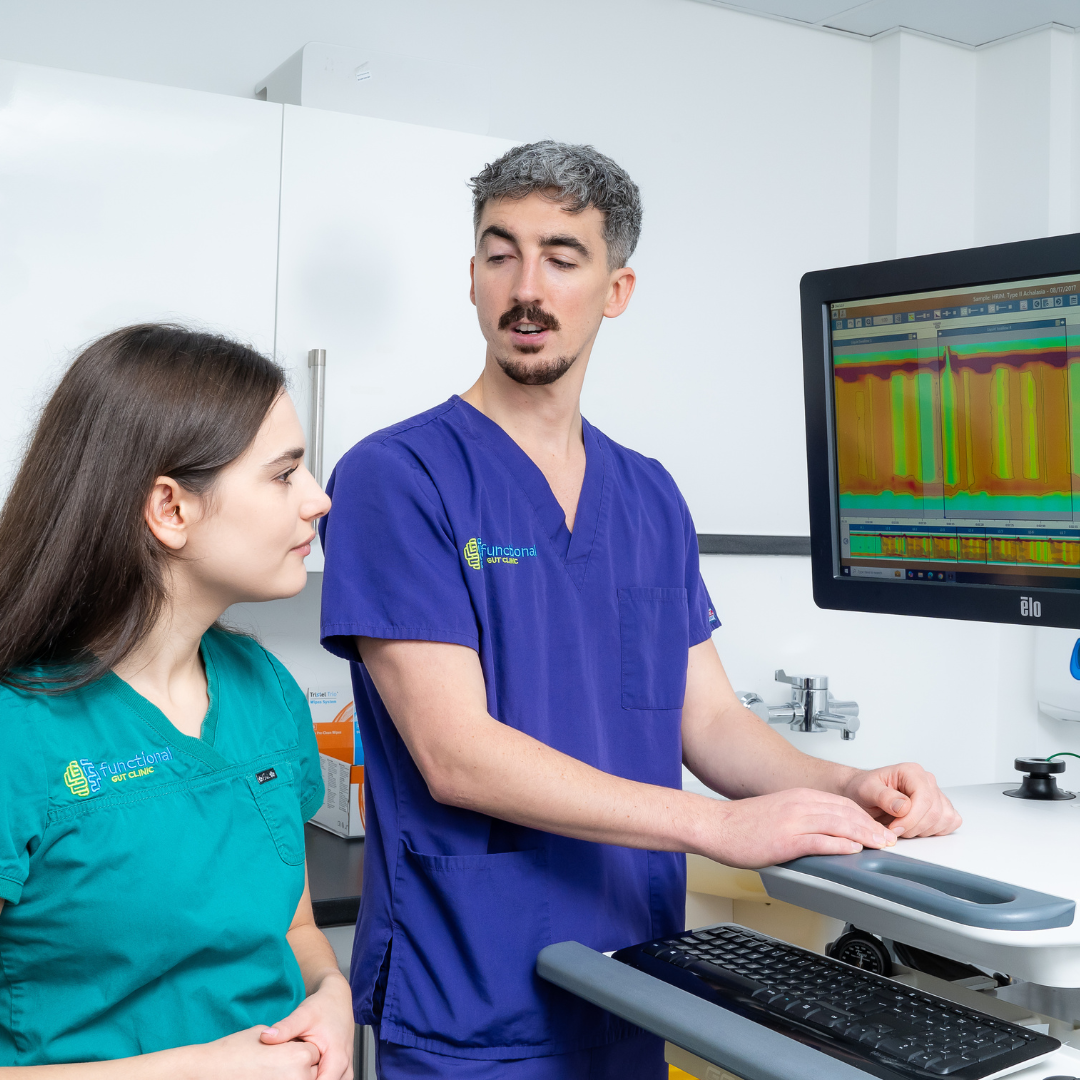Bloating
Struggling with bloating? Here’s what you need to know to find relief.
ALL TEST ARE ACCREDITED & REGULATED BY



What is bloating?
When you’re bloated, your stomach or abdomen can feel full and uncomfortable, or even painful.
This bloating happens when your gastrointestinal tract contains too much gas or air. Bloating can be mild, or more severe, and may present as:
– A visibly distended or swollen abdomen
– Feeling very full and uncomfortable
– Feeling of tightness in the abdomen
– Excess gas – belching and/or flatulence
– Rumbling or gurgling
There are several causes of bloating, so it’s important to diagnose the cause of your bloating and find out why it’s happening to you.

Why does bloating happen?
Prolonged periods of bloating could indicate an underlying health problem, if so you should see your GP.
Possible causes can include:
Irritable bowel syndrome (IBS diagnosis)
Ulcerative colitis, a form of inflammatory bowel disease (IBD), where the inner lining of the large bowel is inflamed and develops ulcers
Crohn’s disease, the other form of IBD, where some parts of your colon are inflamed
Too much bacteria in your small intestine (called small intestinal bacterial overgrowth, or SIBO)
Gastroesophageal reflux disease
Food intolerances, especially lactose or fructose intolerance
Producing too much gas (dysbiosis and fermentation)
Weight gain
Stress or anxiety
Delays in your food and drink moving on from your stomach (called gastroparesis)
Eating too quickly, so that you swallow too much air (called aerophagia)


Diagnosing bloating
Feeling bloated is no fun, but once you know what’s going on you can start to manage your symptoms and the underlying causes.
Testing options:
At the Functional Gut Clinic, we can run the following tests to diagnose the causes of bloating:
Gastric emptying test– which measures how quickly food leaves your stomach
Carbohydrate malabsorption breath test– which finds out if you have certain food intolerances (lactose or fructose)
Small intestinal bacterial overgrowth (SIBO) breath test– which finds out if you have an overgrowth of bacteria in your small intestine (called SIBO)
Oesophageal manometry– which measures the function of your oesophagus (food pipe)
24-hour pH impedance monitoring– which looks at whether you have any reflux
Colonic transit study-a non-invasive test which looks at how long it takes for faeces to pass through your bowl
Learn more about bloating

Microbiome Testing: What Is It? And How Does It Work?
Your gut is home to trillions of bacteria and other microbes from over 100 different species. Known as the “gut microbiome,” these microorganisms — including bacteria, viruses, archaea, fungi, and more — are specific to you. No one else has the same composition of species.
But they’re not all harmful. In fact, your gut microbiome actively supports your health. The “good” bacteria are associated with positive health indicators. These microbes aid in digestion, release compounds that prevent heart disease, lower the risk of diabetes, and may even protect your brain and lift your mood.
Unfortunately, your microbiome can be disrupted, leading to the “bad” microbes taking over your gut. Gut microbiome testing analyses the species and composition to see if this is the underlying problem behind your symptoms.
Below, we’re explaining microbiome testing, from what it is to how it works.
What Is Microbiome Testing?
Microbiome testing examines a person’s stool sample to determine the species composition within their colon. It uses advanced DNA sequencing techniques to analyse the DNA from these species, identifying all the species present.
There’s a lot of genetic material.
It’s estimated that the trillions of bacteria in your gut contain around 3 million genes collectively. But by comparing these genes to known species, we can track down who’s living in your gut.
Based on this information, we can create an action plan to improve your gut microbiome. We can support certain species while trying to reduce the numbers of others, restoring your microbiome to a state that’s perfect for you.
How Does Microbiome Testing Work?
The most common form of microbiome testing is a stool microbiome analysis.
The patient provides a stool sample in a container. Using a test called shotgun metagenomic testing (the most advanced method available), where the DNA is cut up into tiny fragments. These fragments are then sequenced and pieced back together. This gives us complete insight into your microbiome.
It should help us identify all the microbes living in your gut — the “good” and the “bad.”
Unlike older 16S rRNA tests, it tells us the specific species of bacteria, archaea, yeast, fungi, viruses, and parasites. It also shows which functional genes are present.
The benefit? We can see not just what microbes are present, but also what they can do for you. For example, they can break down fibre, produce vitamins, boost immunity, or carry antimicrobial resistance (AMR) markers.
Other Types of Microbiome Testing
Stool microbiome analysis isn’t the only way to understand your gut. Several other tests also give us the telltale signs of issues not just in your colon but throughout your digestive system. They can identify the effects of dysbiosis (an unbalanced microbiome).
These include:
Hydrogen sulphide breath testing. Can detect if specific hydrogen sulphide-producing bacteria are present.
Hydrogen & methane breath testing. Detects bacterial overgrowth and certain food intolerances (lactose and fructose), often used for diarrhoea, bloating, or gas linked to specific bacteria.
Gut permeability (“leaky gut”) assessments. Checks how well your gut lining is functioning and whether unwanted particles are passing into the bloodstream.
SIBO testing. Identifies bacterial overgrowth in the small intestine, a common cause of bloating, discomfort, and irregular bowel habits.
Gastric acid output test. Measures stomach acid levels to assess for low acid (hypochlorhydria), which can affect digestion and nutrient absorption.
Gut motility and transit studies. Tracks how efficiently food moves through your digestive system, helping diagnose motility issues or constipation-related symptoms.
What Can Microbiome Testing Tell You?
Why bother with microbiome testing? Well, it provides insightful and useful information about your gut microbiome composition.
The most important factor is the balance of “good” and “bad” bacteria. These microbes are categorised based on their links to positive or negative health markers. We know what these microbes like to eat. So, by changing your diet, we can support the good ones, helping them outcompete the bad.
Other useful insights include:
Diversity score. This covers the number of different species. The greater your gut diversity, the healthier you will be.
Pathogen detection. If there are any harmful microorganisms present.
Inflammation markers or dysbiosis indicators. Reveals if your gut environment is inflamed or imbalanced due to an overgrowth of harmful bacteria.
Metabolic pathway analysis. Shows what the microbes are capable of doing, e.g., synthesising vitamins or digesting fibre.
When Should You Consider a Microbiome Test?
Most people never consider their microbiome. But it’s an underappreciated factor in lots of conditions. You should consider a microbiome test if you have:
Persistent bloating, constipation, or diarrhoea
IBS-like symptoms
Skin issues (eczema, acne)
Low mood or anxiety
Unexplained fatigue
Recent antibiotics or a poor diet
Get Your Microbiome Tested Today
Struggling with bloating, digestive problems, food intolerances, or low energy and mood? You’re not alone. The problem might be something you least expect — your gut microbiome.
The Functional Gut Clinic offers a full suite of tests to analyse your microbiome, including advanced DNA sequencing of stool samples. Book your test today to take control of your health and get to the root of your symptoms.
Hear from people we’ve helped, just like you.
"Very professional while welcoming and friendly"
"The manner and demeanour of all staff from reception to people carrying out the test was very professional but welcoming and friendly. Atmosphere is very relaxed and all instructions clear and concise."
London Patient

"Highly recommend this"
"Thanks to Dr Hobson and everyone at the Functional Gut Clinic. The whole team is very kind and generous and they are doing things that are cutting edge and they actually get results."
Manchester Patient

"Highly recommend this"
"After stopping my lansoprazole, every time I had a warm drink, I could feel it burn all the way down to my stomach. Thank you to Sam for making me feel at ease." - Manchester Patient

"My experience could not be better"
"Pleasant and knowledgeable staff that made the experience more enjoyable than it should be!" - London Patient

"Very friendly and knowledgeable"
"An excellent service from beginning to end. I would recommend to anyone who was considering having testing done. Very friendly and knowledgeable!" - Manchester Patient

"Very kind and helpful"
"It was also great to have time to talk to the clinicians – very important when you have problems. Reception staff also very kind and helpful." - Manchester Patient

Are you experiencing any other symptoms
Symptoms are often closely connected. Find out more below.
Reflux

Burning mid-chest, worse when bending or lying down
Constipation

Difficulty going to the toilet, unusual stools, often with stomach ache or intestinal cramps, bloating, nausea or appetite loss
Heartburn

A burning pain in your chest, just behind your breastbone.
The pain is often worse after eating...
Regurgitation

Bringing food or drink back up, difficulty swallowing, feeling that food or drink is stuck in your throat, horrible taste in your mouth
Swallowing Issues

Dysphagia - difficulty swallowing, feeling that food or drink is stuck in your throat, horrible taste in your mouth
Diarrhoea

Loose or explosive stools, can’t get to a toilet in time
Abdominal Pain

Cramps; sharp or dull pain, Bloating, Excessive belching, Nausea or vomiting
Faecal Incontinence

Stools leak unexpectedly, Can’t get to a toilet in time
IBS

Abdominal pain or cramping, bloating, changes in bowel habits and urgency, gas

